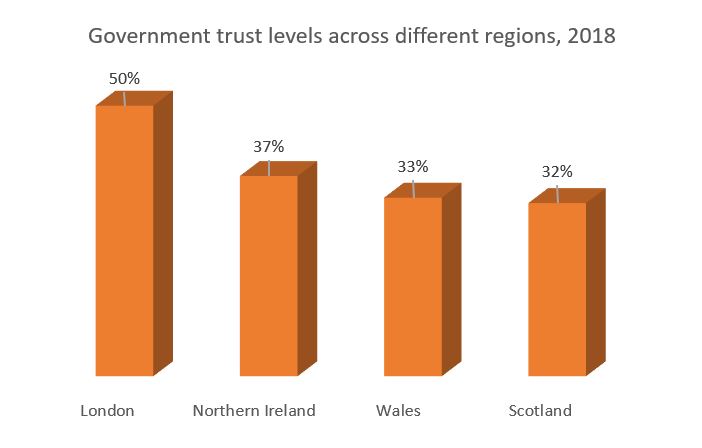Why trust in government matters
Elena Konopelko, CfGS Reseach and Policy Coordinator, explains why government should take action on building trust with the public.
Edelman has published its annual trust barometer report for 2018, and the results indicate that the overall levels of trust continue to be stable but quite low for most of British institutions. The reported trust levels in UK are the following:
- 32% have trust in media,
- 36% trust the government,
- 43% trust businesses, and
- 46% trust NGOs.
At CfGS we are interested in people’s opinions and perceptions about all the major institutions but in particular public trust in government. Looking at the research we can see that behind the headlines there are some positive signs the trust levels in government have clearly improved since 2012, when they dipped as low as 29%. Another positive development is that the trust level remains quite stable, despite political (Brexit for example) and economic (ongoing austerity) challenges.

However, more negatively, government trust levels in the UK is lower than global average. Young people tend to distrust the government more (only 27% of youths trusted the government in 2018), around 93% feel that their views are not well presented by people in politics, and there are significant trust differences across regions, with trust levels in Scotland being the lowest and in London the highest.

The top three reasons for not trusting the government were the following:
- A feeling that the government is not delivering on its promises;
- A perception that the government does not communicate honestly when problems arise and
- A feeling that the government is not transparent enough.
What seems clear from the report is that openness, transparency, and inviting public involvement are the solutions that all tiers of government can embrace to improve its current standing in the eyes of the public. As the core principles that CfGS promotes, we are obviously unsurprised by this. With financial pressures continuing to grow, and difficult political and economic decisions needing to be made both at the central and local government levels, using resources to help improve trust levels may feel like a waste of time. However, leaving trust to chance may have worse consequences for governments in the long-run, leading to further deterioration in the relationship between residents and councillors, or citizens and their MPs.
More findings of the report are available here.





